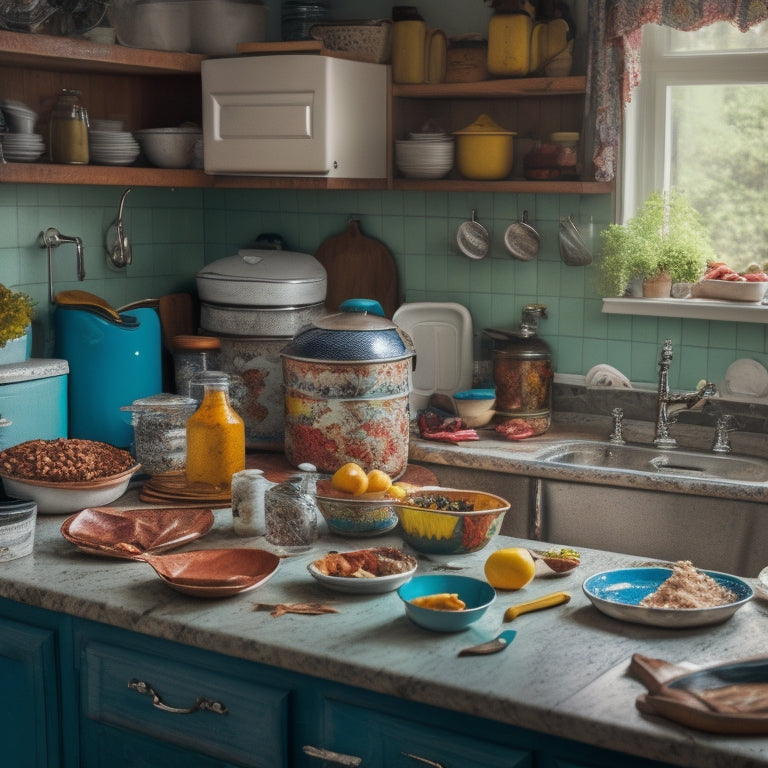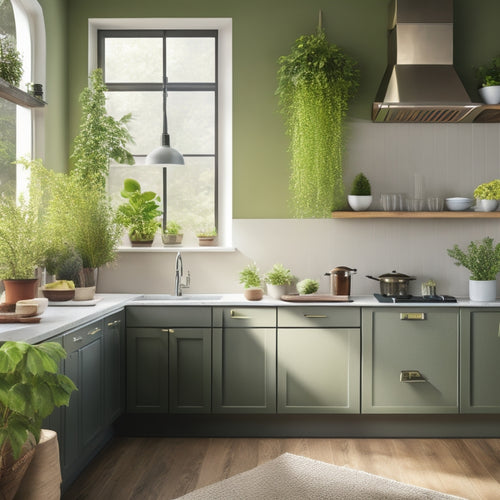
What's Holding You Back From a Clutter-Free Kitchen?
Share
You're stuck in a cluttered kitchen because one or more of five common obstacles are holding you back. You might be expecting a magazine-perfect kitchen, lacking a solid meal planning strategy, or struggling with inadequate storage and systems. Perhaps you're overwhelmed by clutter buildup due to emotional attachments or impulse buying, or insufficient time management skills are causing chaos. Whatever the reason, it's time to identify the root of the issue and tackle it head-on. By recognizing these common pitfalls, you'll be one step closer to breaking free from kitchen clutter and accessing a more efficient, organized space that works for you.
Key Takeaways
• Unrealistic expectations of perfection, driven by magazine spreads, hinder kitchen organization and lead to self-criticism.
• Lack of meal planning strategy results in chaos, wasted ingredients, and last-minute takeout.
• Inadequate storage and systems, such as poor cabinetry and unused vertical space, contribute to clutter buildup.
• Emotional attachment to kitchen items and impulse buying lead to clutter accumulation and disorganization.
• Insufficient time management skills prevent effective task prioritization, leading to kitchen chaos and stress.
Unrealistic Expectations of Perfection
You often set yourself up for failure by aiming for a kitchen that looks like it belongs on the cover of a magazine, where every utensil is perfectly placed and every surface is spotless. This unrealistic expectation of perfection can lead to self-criticism and discouragement when your kitchen doesn't meet these lofty standards.
Newsflash: nobody's kitchen looks like a magazine spread 24/7. It's time to redefine what a clutter-free kitchen means to you.
Let's get real – you're not a professional interior designer or a celebrity chef. Your kitchen is a functional space, not a showpiece. Instead of aspiring for perfection, focus on creating a space that works for you and your family.
Set achievable goals, like clearing off countertops or organizing your pantry. Celebrate your small wins, and don't be too hard on yourself when things don't go as planned. Remember, a clutter-free kitchen is about functionality and efficiency, not about winning a design award.
Lack of Meal Planning Strategy
Now that you've let go of unrealistic expectations, it's time to tackle the root of kitchen clutter: a lack of meal planning strategy, which leads to last-minute takeout, forgotten leftovers, and a plethora of ingredients going to waste.
You're likely familiar with the chaos that ensues when you don't have a clear plan for meals. You end up scrambling to decide what to cook, only to realize you're missing essential ingredients. This leads to unnecessary grocery shopping trips, wasted time, and a kitchen filled with clutter.
To break this cycle, you need a solid meal planning strategy. Start by organizing your recipes in a way that makes sense to you, whether it's digitally or in a physical binder. Then, take some time each week to plan out your meals for the next few days. Make a corresponding grocery list to verify you have everything you need.
Inadequate Storage and Systems
Cluttered countertops and overflowing cupboards are often symptoms of inadequate storage and systems that fail to maximize kitchen space. You may have tried to cram as much as possible into your kitchen, but without a well-designed storage system, clutter will inevitably build up.
To reclaim your kitchen, it's crucial to identify areas where you can implement better organizational solutions.
Here are a few strategies to get you started:
-
Optimize your cabinetry: Consider installing pull-out shelves, Lazy Susans, or adjustable dividers to make the most of your cupboard space.
-
Utilize vertical space: Install hooks, racks, or a pegboard to hang frequently used items, freeing up countertops and drawers.
-
Streamline your countertops: Designate specific zones for food prep, cooking, and storage, and use containers or bins to keep items organized and out of sight.
Overwhelming Kitchen Clutter Buildup
Every kitchen, regardless of how well-organized, can quickly become overwhelmed with clutter buildup when daily habits and routines aren't aligned with storage systems and organizational strategies.
You might find yourself struggling to maintain a clutter-free kitchen due to emotional attachment to certain items or sentimental value. Recognizing that holding onto items 'just in case' or because of emotional attachment is a significant contributor to clutter.
Another common culprit is impulse buying. When you bring new items into your kitchen without considering their purpose or storage space, they can quickly add to the clutter. You must be truthful with yourself about why you're purchasing something and whether it's truly necessary.
Question if you have space for it and if it aligns with your kitchen goals. By being more mindful of your purchasing habits and letting go of emotional attachments, you can prevent clutter from building up in the first place.
Insufficient Time Management Skills
Poor time management skills can lead to a perpetual state of chaos in your kitchen, as daily tasks and meal prep get sacrificed to accommodate clutter-related stress and disorganization. You're left feeling overwhelmed, stressed, and stuck in a cycle of clutter.
To break free, developing effective time management skills that prioritize tasks and promote effective organization is crucial.
Here are three strategies to get you started:
-
Set a daily timer: Allocate a specific time slot for kitchen tasks, such as meal prep, cleaning, and organization. Stick to it, and you'll be amazed at how much you can accomplish.
-
Prioritize tasks: Identify the most critical tasks that need attention, and tackle them first. This will help you stay focused and make sure that important tasks don't fall by the wayside.
-
Create a 'zone defense': Divide your kitchen into zones, each with its own set of tasks and responsibilities. This will help you stay organized, focused, and in control of your kitchen space.
Frequently Asked Questions
How Do I Maintain Motivation to Declutter My Kitchen Over Time?
To maintain motivation, you set daily reminders, enlist an accountability buddy, and celebrate small victories with rewards, fueling your drive to declutter your kitchen and achieving a space that sparks joy and empowers you.
Can I Declutter My Kitchen With Limited Mobility or Disability?
You're a master navigator, charting a course through treacherous waters of clutter. Now, adapt your vessel to your needs - employ adaptive organization strategies and prioritize kitchen accessibility to guarantee a smooth, empowered journey to a clutter-free haven.
What if My Family Members Resist the Changes I'm Making?
When family members resist your changes, acknowledge their concerns and involve them in the decluttering process. Find common ground through open communication and compromise, ensuring everyone's needs are met, and your kitchen goals are achieved.
How Do I Decide What Kitchen Items Are Worth Keeping or Donating?
As you stand amidst the kitchen chaos, imagine a treasure chest of essentials, where every item shines like a gem. You'll decide what's worth keeping by weighing sentimental items against usefulness, aesthetics, and functionality, then make ruthless cuts to reveal your kitchen's hidden treasures.
Can a Clutter-Free Kitchen Really Improve My Mental Health?
You'll be amazed how a clutter-free kitchen can improve your mental health by reducing stress, promoting mental clarity, and creating a peaceful environment, allowing you to focus and feel more in control of your life.
Related Posts
-

3 Essential Steps to a Clutter-Free Kitchen
You'll reach a clutter-free kitchen by following three essential steps. First, purge and declutter by gathering items...
-
Why Athletes Need Customized Meal Planning Templates
You need a customized meal planning template because a one-size-fits-all approach to nutrition can't possibly fuel yo...
